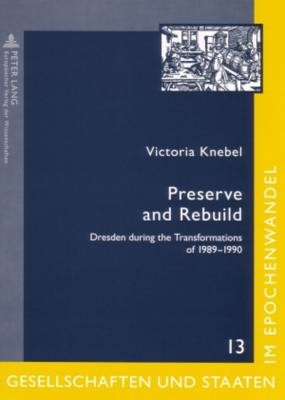
- We will send in 10–14 business days.
- Author: Victoria Knebel
- Publisher: Peter Lang D
- ISBN-10: 3631559542
- ISBN-13: 9783631559543
- Format: 14.8 x 21 x 1.1 cm, minkšti viršeliai
- Language: English
- SAVE -10% with code: EXTRA
Preserve and Rebuild; Dresden during the Transformations of 1989-1990- Architecture, Citizens Initiatives and Local Identities (e-book) (used book) | bookbook.eu
Reviews
Description
The reunification of Germany in 1990 has prompted far-reaching debates about German identity, history and tradition. One framework for these debates is provided by the extensive urban development and building activities which have commenced in Eastern Germany since 1990. This ethnographic case study of post-communist Dresden explores the complex symbolic meanings of such projects as the rebuilding of the Frauenkirche, Dresden's quarrels with the UNESCO about a new Elbe bridge, and many others. It traces a history of civic engagement from the time of the GDR through to the present of reunified Germany, and demonstrates the built environment's importance for identity construction in periods of social transformation.
EXTRA 10 % discount with code: EXTRA
The promotion ends in 21d.23:37:21
The discount code is valid when purchasing from 10 €. Discounts do not stack.
- Author: Victoria Knebel
- Publisher: Peter Lang D
- ISBN-10: 3631559542
- ISBN-13: 9783631559543
- Format: 14.8 x 21 x 1.1 cm, minkšti viršeliai
- Language: English English
The reunification of Germany in 1990 has prompted far-reaching debates about German identity, history and tradition. One framework for these debates is provided by the extensive urban development and building activities which have commenced in Eastern Germany since 1990. This ethnographic case study of post-communist Dresden explores the complex symbolic meanings of such projects as the rebuilding of the Frauenkirche, Dresden's quarrels with the UNESCO about a new Elbe bridge, and many others. It traces a history of civic engagement from the time of the GDR through to the present of reunified Germany, and demonstrates the built environment's importance for identity construction in periods of social transformation.


Reviews